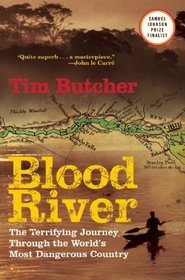This was a very engrossing narrative of Tim Butcher's harrowing travel across the African Continent following the path of the explorer Henry Morton Stanley in 1874-1877. Butcher is a journalist and correspondent of the Daily Telegraph. Stanley was also a reporter for the Telegraph and in the Victorian era he was probably the world's best-known journalist, famous for tracking down the Scottish explorer, David Livingstone in 1871. Then he made an epic trip across Africa between 1874 and 1877 by mapping the Congo River from east to west. Butcher decides to follow Stanley's route of nearly 3,000 miles. He is warned that his plan is suicidal but sets out for the Congo's eastern border carrying only a backpack and some money hidden in his boots. He makes his way on the back of motorbikes, in dugout canoes, and a ramshackle boat used by the UN on the river. He is helped out along the way by aid workers, missionaries, and even a pygmy leader traveling through very dangerous territory that had become worse and worse during the past century. The Congo has been rampant with wars and killings, corrupt politicians, and local men in charge who only want to steal from everyone.
Butcher's telling of his forty-four day journey is very absorbing in itself but he also throws in a lot of the history of the Congo dating back to 1482 when the Congo River was discovered by the Portuguese explorer, Diogo Cão. He then relates the story of Stanley and how he helped Belgium's King Leopold establish the Congo Free State which he used to exploit the resources of the Congo killing millions along the way. And then the Congo wins its independence from Belgium in 1960 but instead of taking advantage of this, the country is further exploited by ruthless leaders including Joseph Mobutu who established a single-party system and declared himself head of state. At the time Butcher made his trip in 2004, the country had devolved into a mainly lawless and corrupt nation.
Before reading this book, I didn't really know a whole lot about the Congo and its history. This has really motivated me to read more. I have a few books that Butcher mentions in his narrative including the novels The Poisonwood Bible and The African Queen. I also have a nonfiction book about Stanley and Livingstone called Into Africa and the story of King Leopold and his exploitation of the Congo called King Leopold's Ghost. I hope to read all of these in the near future.
Butcher's telling of his forty-four day journey is very absorbing in itself but he also throws in a lot of the history of the Congo dating back to 1482 when the Congo River was discovered by the Portuguese explorer, Diogo Cão. He then relates the story of Stanley and how he helped Belgium's King Leopold establish the Congo Free State which he used to exploit the resources of the Congo killing millions along the way. And then the Congo wins its independence from Belgium in 1960 but instead of taking advantage of this, the country is further exploited by ruthless leaders including Joseph Mobutu who established a single-party system and declared himself head of state. At the time Butcher made his trip in 2004, the country had devolved into a mainly lawless and corrupt nation.
Before reading this book, I didn't really know a whole lot about the Congo and its history. This has really motivated me to read more. I have a few books that Butcher mentions in his narrative including the novels The Poisonwood Bible and The African Queen. I also have a nonfiction book about Stanley and Livingstone called Into Africa and the story of King Leopold and his exploitation of the Congo called King Leopold's Ghost. I hope to read all of these in the near future.
a man's quest to re-create the journey of famous explorer Stanley down the Congo River - a dangerous if not stupid adventure even in modern times. Hard to believe he made it alive, when he was in many situations that could have easily ended in disaster. I admired his determination, though I'm not sure what his his journey accomplished except to document the decay of civilization throughout the Congo region since the 1950's.




